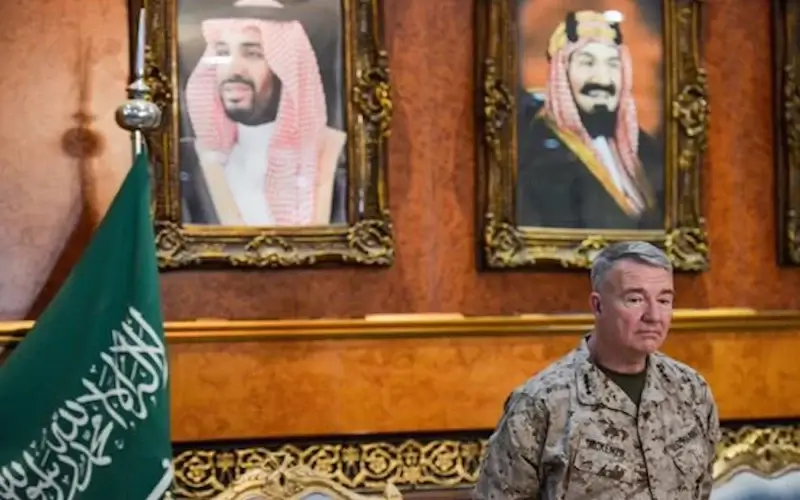In a new revelation by Pentagon officials Wednesday, the United States military command responsible for Middle East operations is developing plans to open a new military testing facility in Saudi Arabia. According to officials, the purpose of such a facility will be to evaluate and develop new technologies to combat the growing threat of unmanned drones from the Islamic Republic of Iran and its terrorist proxies, creating newly integrated air and missile defense capabilities.
According to reports, CENTCOM plans to name the facility the Red Sands Integrated Experimentation Center, drawing similarities to the White Sands Missile Range, a U.S. military testing facility for extended-range missiles in New Mexico. While the location has not been confirmed yet, Defense officials argue that Saudi Arabia is the location that makes the most sense. Officials state that the vast open space owned by the Saudi Royal Government and the lack of nearby civilian population centers means that CENTCOM can evaluate different electronic warfare methods, like signal-jamming and directed energy.
"The range areas and airspace the U.S. military has available to conduct weapons testing is limited, and the restrictions on those ranges are growing by the day. Gaining access to the relatively desolate regions of Saudi Arabia to conduct weapons testing will increase the capabilities of the U.S. and our allies and strengthen the associated linkages," said John Venable, a senior research fellow for defense policy at the Davis Institute for National Security and Foreign Policy.
Defense officials also understand that Saudi Arabia is "the center of gravity for many future regional security endeavors." Last month, CENTCOM commander, Army General Michael Kurilla, proposed the idea in a meeting with several U.S. allies in the region, receiving enormous support for the new military project. This latest development comes amid increasing security cooperation between Arab states and Israel against Iran, which has provided ballistic missiles, drones, and other military equipment over recent years.
Reports from the Middle East indicate that Persian Gulf Arab states like Saudi Arabia and others have been alarmed at how fast Iran has provided quick and effective missiles and drones to their proxies, like the Iranian-backed Houthi rebels in Yemen. For many months, the Houthis have targeted oil facilities and other critical infrastructure in Saudi Arabia through drones and missile strikes.
"Iran has been directly or indirectly responsible for attacks on Saudi Arabia for the last several years. While they will likely use this agreement as the rationale to launch new attacks, it will have a little real effect on their behavior," explained Venable.
During his visit to Saudi Arabia in July, President Joe Biden stated the potential for regional governments to team up to boost missile defenses along with American support.
"This move will have little effect on the actions of Iran, and its government will continue to create havoc in the region as long as the Biden administration is all but pleading with Iran to return to the JCPOA. Putting a lid on Iranian aggression will not happen until the U.S. returns to the full court pressure the previous administration levied on the whole of that terrorist regime," explained Venable.
Regarding the cost of such a military endeavor, there is no official estimate; however American officials expect to fund about 20 percent of the project and provide around 20 percent of the personnel, leaving allies to cover the rest. Officials argue that the idea draws many nations into a "pragmatic security arrangement" when CENTCOM is trying to shift the command's focus from the U.S. military presence in the Middle East, emphasizing the need to strengthen the cooperation of allies. While there is no exact timeline for when Red Sands could start, officials believe it is not likely before the end of this year.
Currently, the Biden administration is attempting to revive the 2015 nuclear agreement with Tehran, promising to provide economic sanctions relief in exchange for Iran to curtail their uranium enrichment. In response to ongoing negotiations, Israel and the Arab states have called on the administration to change its course with Iran, given that the Islamic regime is demanding concessions that many believe will support terror in the region. In the past few weeks, Israeli Prime Minister Yair Lapid and Defense Minister Benny Gantz have met with Biden administration officials in Washington to relay their concerns and how to prevent the regime from acquiring a nuclear weapon should an agreement not come.
In past months, the Israeli military has been preparing for a potential military strike against Iranian nuclear facilities, receiving military equipment necessary to conduct such an operation from the American military, according to various media reports. While the administration has said it does not support military operations against Iran, the President and Secretary of State Antony Blinken have reiterated their support for Israel's safety and security.
Many national security experts argue that the President and his administration should adhere to the concerns over the Iran nuclear agreement and avoid negotiating with a regime that continues to sponsor terrorism against Americans at home and abroad. These experts argue that the President and his team should focus on supporting regional allies like Israel and the Arab states, promoting economic and military cooperation to deter Iran and its terrorist proxies as the Trump administration did under the Abraham Accords.
"The Abraham Accords have really opened doors to Israel throughout the Middle East. The connective tissue that has developed behind the scenes between Saudi Arabia and Israel may lead to Israel’s participation with little additional effort from America," according to Venable.
Members of Congress have also called on the administration to cease negotiations with Tehran, calling on the President and his officials to enact economic sanctions against Iran for targeting American military personnel and Americans at home.
"This deal wasn't hanging over the JCPOA negotiations, and for CENTCOM to strike the deal while the State Department offers one concession after another to bring Iran back into that agreement appears to be another disconnect between the different departments and agencies within the Biden administration. It hard to find the integrity of effort between or discern an overarching strategy that links them together and with that, it would be a stretch to see this a negotiating ploy, or an alternative approach to dealing with Iran," exclaimed Venable.
Elliot Nazar is a foreign affairs writer completing degrees in political science and international relations with emphasis in American-Middle East foreign policy, Iran, Israel, and terrorism at UCLA.










